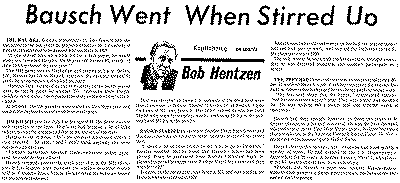|
|
Bausch Went When Stirred Up
by Bob Hentzen
THE WAY BILL Hargiss remembers it, Jim
Bausch had one bad game in the two years he played football at the University of
Kansas. It happened to be against Kansas State in 1929.
"If you stirred him up a little bit for a ball game, he
would really go," recalled Hargiss, the 88-year-old former KU coach. "I didn't
let him forget the next year."
The 1930 game was in Manhattan and started at 2 p.m.
Before 2:01, Kansas led 7-0 as Bausch returned the opening kickoff 95 yards for
a touchdown and kicked the point.
"Jarring Jim" wrapped up the 14-0 victory in the fourth
period when he ran 59 yards for another TD, "strewing three Purple tacklers in
his wake," so reported the story in the next day's Daily Capital.
In between the 210-pounder intercepted an Alex Nigro
pass and punted the Jayhawks out of trouble several times.
JIM BAUSCH died last July 9 at the age of 68. His
death was not well reported at the time. That's too bad because a lot of folks
believe he was the greatest athlete in the history of the state.
Hargiss is one of those. "He's the greatest all-around
athlete I ever coached," he said, "and I don't think anybody else ever coached a
greater one.
"Football, basketball, baseball, track, swimmer,
golfer, gymnast, he could do them all well."
Bausch certainly proved the track part of it in the
1932 Olympics in Los Angeles when he broke the world's decathlon record held by
Finland's Paavo Yrjola. He was voted the Sullivan Award for the accomplishment.
That was the year all three U.S. entrants in the
decathlon were from Lawrence — Wilson "Buster" Charles Jr. of Haskell, Clyde
Coffman of KU and Bausch. The latter rallied to win the Gold Medal with some
tremendous marks, including 13-1 1/2 in the pole vault and 203-2 1/2 in the
javelin.
BAUSCH STARTED IN sports at Garden Plain High School
and Hargiss, coaching at Emporia State, became aware of his talent then.
"I spent a lot of time trying to get him to go to
Emporia," Hargiss recalled. But he found that Bausch's future had been plotted.
When he graduated from Wichita Cathedral High, he planned to go to Fairmont (now
Wichita State) for a year and then transfer to KU.
Hargiss, in the meantime, was hired at KU and was
waiting for Bausch when he arrived in 1929.
Bausch was twice all-conference in football (he played
basketball and took part in track too) and led the Jayhawks to the Big Six
championship in 1930.
The only reason he wasn't all-conference three straight
years is that he was declared ineligible and couldn't participate as a senior.
YES, THEY HAD those controversies in the no-scholarship
30s too. It involved Bausch's job of selling insurance for booster Red Lupton.
Other schools charged he was being paid for bogus work.
"The less said about that the better," commented
Hargiss "but the accusations weren't true. They were unfair and uncalled for. He
was making $60 a month and sold $120,000 worth of insurance."
Bausch had done enough, however, in those two years to
be forever classed as a football immortal. He was the first Jayhawk selected to
play in the East-West Shrine game. He later became a charter selectee to the
National Football Hall of Fame. He also enshrined in the Kansas Sports Hall of
Fame.
Bausch died in Hot Springs, Ark., where he had lived
quietly a number of years. He had worked for the U.S. Department of Agriculture
for 30 years. A brother Frank ("Pete"), who played in the KU backfield with him
lives in Wichita.
Although Jim Bausch is gone now, another Kansas-Kansas
State football game is a dandy time to insure the hero of the 1930 contest isn't
forgotten.